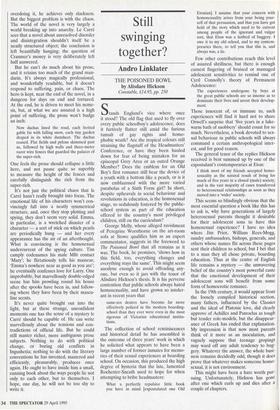Still swinging together?
Andro Linklater
THE POISONED BOWL by Alisdare Hickson Constable, .£14.95, pp. 250 Stands England's vice where once it stood? The old flag that used to fly over every public schoolboy's adolescence, does it furtively flutter still amid the furious tumult of gay rights and homo- phobic wrath? Are the tropical colours still straining the flagstaff of the Headmasters' Conference, or have they been hauled down for fear of being mistaken for an episcopal Grey Area or an outed Orange Member? Does the emblem for an Old Boy's first romance still bear the device of a youth with a bottom like a peach, or is it now emblazoned with the more varied parabolas of a Sixth Form girl? In short, despite upheavals in social behaviour and revolutions in education, is the homosexual stage, so sedulously fostered by the public- school system as part of the education offered to the country's most privileged children, still on the curriculum?
George Melly, whose alleged ravishment of Peregrine Worsthorne on the art-room sofa at Stowe qualifies him as an expert commentator, suggests in the foreword to The Poisoned Bowl that all remains as it was. The book, he promises, 'shows how in this field, too, everything changes and everything stays the same'. This might seem anodyne enough to avoid offending any- one, but even so it jars with the tenor of Alisdare Hickson's thesis. It is his perverse contention that public schools always hated homosexuality, and have grown so intoler- ant in recent years that
same-sex desires have become far more effectively policed in the modern boarding- school than they ever were even in the most rigorous of Victorian educational institu- tions.
The collection of school reminiscences and historical detail he has assembled is the outcome of three years' work in which he solicited what appears to have been a large number of former inmates for memo- ries of their sexual experiences at boarding school. On occasion, this produced the high degree of hysteria that the late, lamented Rochester-Sneath used to hope for when attempting to bribe headmasters:
What a perfectly repulsive little book you have in mind [expostulated one Old Etonian]. I assume that your concern with homosexuality arises from your being your- self of that persuasion, and that you have got hold of the story which used to be current among people of the ignorant and vulgar sort, that Eton was a hotbed of buggery. I owe it to my old school, and to my contem- poraries there, to tell you that this is, and always was, a lie.
Few other contributions reach this level of assured shrillness, but there is enough earnest fingering of bruised or massaged adolescent sensitivities to remind one of Cyril Connolly's theory of Permanent Adolescence:
The experiences undergone by boys at the great public schools are so intense as to dominate their lives and arrest their develop- ment.
Those innocent of, or immune to, such experiences will find it hard not to share Orwell's surprise that 'five years in a luke- warm bath of snobbery' should count for so much. Nevertheless, a book devoted to sex- ual behaviour in public schools will always command a certain anthropological inter- est, and for good reason.
The general tenor of the replies Hickson received is best summed up by one of the expostulant's contemporaries at Eton: I think most of my friends accepted homo- sexuality as the natural result of living for much of five years in a closed (male) society; and in the vast majority of cases transferred to heterosexual relationships as soon as they moved into a 'wider' society.
This seems so blindingly obvious that the most essential question a book like this has to ask is, why have generations of largely heterosexual parents thought it desirable for their adolescent sons to have this homosexual experience? I have no idea where Jim Prior, William Rees-Mogg, sundry ambassadors, bishops, generals, and others whose names flit across these pages sent their children to school, but I bet that to a man they all chose private, boarding education. Thus at the centre of English life remains a mystery — the unwavering belief of the country's most powerful caste that the emotional development of their adolescent sons will benefit from some form of homoerotic romance.
In the 19th century, it would appear from the loosely compiled historical section, many fathers, influenced by the Classics and the ideal of Platonic love, did clearly approve of Achilles and Patroclus as tough but tender role-models, but the disappear- ance of Greek has ended that explanation. My impression is that now most parents think of it more as an inoculation, and vaguely suppose that teenage gropings may ward off any adult tendency to bug- gery. Whatever the answer, the whole busi- ness remains decidedly odd, though it does prove that whatever makes someone homo- sexual, it is not environment.
This might have been a hare worth pur- suing. Unfortunately, Hickson has gone after one which curls up and dies after a couple of chapters.


























































 Previous page
Previous page